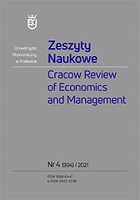The Relationships between Social Security Funds and Macroeconomic Changes. An Empirical Analysis of the EU-CEE Countries
The Relationships between Social Security Funds and Macroeconomic Changes. An Empirical Analysis of the EU-CEE Countries
Author(s): Barbara Pawełek, Alina KlonowskaSubject(s): Supranational / Global Economy, Labor relations, Economic policy, EU-Approach / EU-Accession / EU-Development, Labour and Social Security Law
Published by: Wydawnictwo Uniwersytetu Ekonomicznego w Krakowie
Keywords: social security; growth; unemployment; inflation; Granger;
Summary/Abstract: Objective: This paper investigates whether and which of a set of macroeconomic variables may be a Granger cause for changes in the financing of the social security sector, and vice versa. Research Design & Methods: Descriptive statistics, the bootstrap panel Granger causality test, and Pesaran CD test for cross-sectional dependence in panels and Pesaran’s CIPS test for unit roots in panels were applied. Panel data of the CEE countries, which are members of the European Union, was used. The research period was 2000–2019. Findings: It was determined that lagged values of macroeconomic indicators can improve forecasting of social security sector expenditure. In turn, understanding the social security sector’s expenditure may contribute to better forecasting of the macroeconomic indicators considered for the research. Implications/Recommendations: Maintaining stable economic growth may contribute to the financial stability of the social security system. Contribution: The research is the first to refer to the financing of the social security sector. The study provides a framework that takes full account of the main elements of social security systems and associates them with the most significant macroeconomic indicators. Article type: original article.
Journal: Zeszyty Naukowe Uniwersytetu Ekonomicznego w Krakowie
- Issue Year: 995/2022
- Issue No: 1
- Page Range: 9-26
- Page Count: 18
- Language: English

